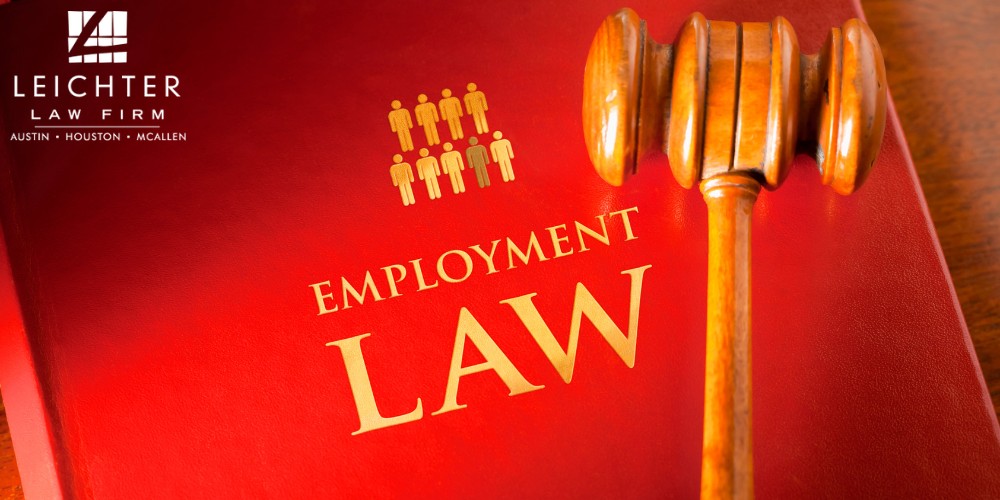Employment Lawyer Houston and Austin, TX
Top Employment Lawyers Austin and Houston, TX

Leichter Law’s labor and employment law practice represents clients in a wide range of employment-related cases. Typically, we limit our practice to the representation of Texas employees in cases against employers. We know that standing up to a big company in employment law cases as a single employee can feel daunting. For that reason, an employment lawyer Houston with our firm will ensure that each employee’s voice is heard.
Our clients receive the attention of a Board Certified Labor and Employment Law Specialist. What this means is that you will receive counsel from a Texas employment attorney with a legal specialization in employment law issues. They will have more knowledge and training than the average employment attorney, which can give you the edge you need in your case.
Our Texas employment attorneys argue aggressively for workers’ rights. Because we work primarily with employees, rather than employers, we do not concern ourselves with losing business clients. This enables us to fight tirelessly for employees and take on the most difficult labor law complaints. Above all else, our firm is devoted to protecting the rights of employees under federal and state laws. If you are facing employment disputes of any kind, our attorneys are here to help. To schedule a free consultation with our skilled employment lawyers, call our office at (512) 495-9995 today.
What Is an Employment Law Attorney?
Employment lawyers provide legal representation to employees, employers, or both sides. Those representing workers generally handle cases involving labor law violations by employers. Some examples of these cases include unpaid wages, workplace discrimination, wrongful termination, and other employment cases.
Employment attorneys who focus on representing employers will usually defend them in the above cases, but they can also help employers adjust their policies and handbooks according to changes in labor laws. Other focuses of attorneys who represent employers include severance agreements and employment contracts.
At Leichter Law, we have extensive experience advocating for workers’ rights in cases against their employers. Facing a large corporation in a lawsuit can be intimidating, but you don’t have to tackle this alone. Our Austin and Houston employment lawyers are here to amplify your voice and fight tirelessly on your behalf.
What Does an Employment Lawyer Do?
Employment lawyers litigate and manage disputes between employers and employees that fall under federal and state labor laws. They are well-versed in all state and federal laws that apply to certain cases, and are adept at advising employees on how to exercise their rights. Leichter Law’s legal team is extremely knowledgeable in both federal labor laws and the Texas Labor Code. We use this specialized knowledge to help our clients with many case types, including those that involve the following.
- Filing complaints against an employer with a government agency
- Handling cases and lawsuits regarding employment discrimination, unpaid wages, and even class action lawsuits
- Researching previous cases and labor laws to provide comprehensive legal guidance to clients
- Representing clients in arbitration, mediation, and other alternative dispute resolution tactics
- Informing clients of their rights under certain labor laws, as well as their rights related to labor unions
- Drafting, reviewing, and adjusting employment contracts
What Is Texas Employment Law?
Employment law covers a wide range of issues that originate in the workplace, including salaries, benefits, lawsuits, and any other issue that arises from hiring to termination of employment. In Texas, these laws are defined in the Texas Labor Code and many Federal laws and regulations. Each state has its own set of rules and regulations when it comes to employment, and Texas is no exception.
Even municipalities can create legislation related to employment law. If you are facing a legal issue at your workplace, it is extremely important to work with a seasoned employment lawyer. Many local, state, and federal labor laws are complicated and difficult to understand. However, working closely with employment lawyers will ensure that you fully understand your rights as an employee.
On What Grounds Can I Sue My Employer?
This largely depends on where you live and work, but many states allow employees to sue their employers for most of the reasons below. Texas law specifically permits employees to file claims against their employers in the following cases.
- Breach of contract
- Discrimination based on gender, race, religion, national origin, disability, age, or pregnancy
- Retaliation
- Sexual harassment
- Wage theft (unpaid overtime)
Because Texas labor law encompasses such a wide range of employment issues, the above list is not exhaustive. If you believe or suspect that your employer has violated state or federal labor laws, we strongly recommend scheduling a consultation with our Texas labor lawyers. We can advise you of your rights and counsel you on the next steps to take.
Can I Sue My Employer for a Hostile Work Environment?
In order to have a successful hostile work environment claim, you must be able to prove that the negative behavior was so severe that it affected or changed the conditions of your employment. You must also show that you are part of a protected class, which depends on your race, gender, age, sexuality, or even your religious beliefs.
A hostile work environment may develop if you are harassed or discriminated against based on protected class status. For example, maybe you work in an office where you are the only employee of your particular race or ethnicity. If another employee is rude to you in general, this is not enough to constitute a hostile work environment, no matter how uncomfortable it may be. However, if that employee were to call you a name or a racial slur based on your protected class status, this could be considered a hostile work environment.
Keep in mind that their actions must qualify as “severe or pervasive” behavior. Both state laws and the United States Equal Employment Opportunity Commission have their own standards for what constitutes this behavior. Speaking with an attorney can give you insight into your rights, as well as how you should proceed.
Texas Labor Law Experts
The employment law attorneys at the Leichter Law Firm frequently handle unpaid wage claims, sexual harassment cases, wrongful termination claims, and other fair pay issues. Our labor and employment attorney, David Langenfeld, is a board-certified specialist in labor and employment law. He earned this legal specialization after demonstrating years of experience, being vetted by the Texas Board of Legal Specialization, and passing an incredibly difficult written examination.
Of more than 100,000 active attorneys of the State Bar of Texas, only 10% receive a board certification in any legal area. Less than 1% of these certified attorneys have been certified in labor and employment law. If you’re looking for the best employment lawyers in the state of Texas, you’ve found them at Leichter Law.
What Case Types Fall Under Employment Law in Texas?
Our clients benefit from an entire team of qualified legal professionals. We are dedicated to leveling the playing field and bringing justice to those willing to stand up for their rights. As we mentioned previously, many legal issues fall under the umbrella category of labor and employment law, such as discrimination, unpaid overtime, and more. Some of the most common categories that our Texas employment law attorneys handle include the following.
Unpaid Overtime
The Fair Labor Standards Act (FLSA) is a federal law which requires most employees who work more than 40 hours in a week to receive overtime pay. This law is often ignored or misapplied by employers. Employees often fail to receive payment of overtime wages to which they are legally entitled.
Common misconceptions are that all salaried employees, licensed professionals, and independent contractors are not entitled to overtime. While these assumptions are sometimes true, they often are not and the worker is unlawfully denied earned wages. A Texas unpaid wages lawyer with our firm will help you recover these lost wages when they are legally owed to you.
Employment Discrimination
Many states, such as Texas, are “employment at-will” states. This generally means that an employer can terminate an employee at any time for any lawful reason. This does not mean that an employer can terminate an employee for any reason. A variety of state and federal laws protect employees from discrimination in the workplace.
Take Title VII of the Civil Rights Act of 1964 as an example. This law makes it illegal to discriminate against someone on the basis of race, color, religion, sex, or national origin. Discrimination involves treating someone (an applicant or employee) unfavorably because they are of a certain race, color, religion, sex, or national origin. This law forbids discrimination when it comes to any aspect of employment. This includes hiring, firing, pay, job assignments, promotions, layoff, training, fringe benefits, and any other term or condition of employment.
I Think I’m Being Discriminated Against. How Can I Know for Sure?
Rude comments and bad attitudes, while unpleasant, do not have enough weight to justify discrimination lawsuits. Discrimination can occur during any part of the employment process from hiring to termination. This can make it difficult for employees to pinpoint or prove. So, what are the telltale signs that you may be experiencing discrimination based on your race, gender, age, or other factors? Some examples of both direct and indirect discrimination include the following.
- Unfair disciplinary actions against an employee for complaints about salaries, harassment, or discrimination
- Wage gaps and unequal pay between two employees with the same experience in the same position who are of a different gender, race, age, etc.
- Unfair promotion choices, such as an employer passing you over for a position that you are well qualified for in favor of someone with little experience
- Offensive or demeaning comments about your race, age, gender, or other protected classification. These can devolve into creating a hostile work environment.
- Inappropriate questions during an interview, such as those about your age, gender, sexuality, or even about a disability
- Clear lack of diversity, meaning most or all of the employees are homogenous in terms of age, gender, race, or other protected characteristics
How Do I Prove Workplace Discrimination?
If you can identify the signs of workplace discrimination, the next step is to gather evidence in order to prove it. Generally speaking, there are three types of evidence you can gather to support your claim of discrimination: direct evidence, circumstantial evidence, and pattern and practice evidence.
- Direct Evidence: This type of evidence is powerful in court, as it can easily show discrimination without making any assumptions about the employer’s actions or intent. One obvious example is an employee receiving an email that they were passed up for a promotion because of their age. This email would be a form of direct evidence. Unfortunately, direct evidence is difficult to find, as employers are well-aware of the consequences of being overtly discriminatory.
- Circumstantial Evidence: While circumstantial evidence is easier to come by, it holds less weight in court. That isn’t to say, however, that it has no use. In fact, many employees use many pieces of circumstantial evidence to prove their case. This type of evidence is proven by assumptions or inferences rather than direct facts.
- Pattern and Practice Evidence: This form of evidence is fairly straightforward, but it may require substantial research. Its purpose is to show that an employer has a pattern of discrimination against certain types of employees based on their protected class status.
Whistleblower
Whistleblowers serve a very important role in society. Employees who report an employer’s illegal or unethical conduct protect others from financial fraud and physical danger. Therefore, to encourage employees to report illegal activity, financial fraud, and safety violations, the government has enacted “whistleblower” laws to protect (and sometimes compensate) employees who report such conduct. Examples of protected whistleblower activities are:
- Reporting the falsification of financial documents and other fraudulent accounting activities by corporations.
- Notifying authorities of safety and environmental concerns to agencies such as OSHA.
- Reporting Medicaid fraud and other illegal billing practices by hospitals, nursing homes, and other healthcare providers.
- Notifying relevant authorities by physicians, nurses, and other healthcare workers of abuse, neglect, or other substandard medical care provided to patients.
- Employees that notify relevant authorities of these types of violations are protected from adverse employment actions.
Breach of Contract
Many states, including Texas, are employment at-will states. However, employment and other business relationships may not be terminated in violation of enforceable contracts. Licensed professionals are often employed or otherwise associated with a group or partnership by means of a valid enforceable contract. When that individual is terminated or ousted from their group, they will have legal remedies available such as claims for money damages and possibly injunctive relief. Our qualified Texas employment law attorneys can assist clients in this area of the law.
Non-Compete Agreements
Employment agreements often contain provisions prohibiting an employee from practicing their chosen profession. It is usually within a particular geographic region for a certain amount of time. These agreements may also seek to prohibit the solicitation of the former employer’s clients or patients. It could also prohibit the disclosure of its confidential information, and the “raiding” of its employees.
Enforcement of these non-compete agreements can effectively deny a person the ability to earn a living in some cases. The law in this area is complicated and open to various interpretations depending on any given factual scenario. The law is even more complicated when it comes to non-compete agreements when they pertain to physicians. Whether these agreements are enforceable turns on a number of different factors.
Our Texas employment law attorneys are qualified to counsel clients regarding these issues. We challenge the enforcement of these agreements under the appropriate circumstances.
Wrongful Termination
In some situations, it is illegal for employers to fire their employees. This is called wrongful termination. There are many reasons that the law might consider a termination wrongful. The most common scenarios include the following.
- The employer is in violation of terms of the employee’s employment contract by firing him or her. This scenario is also a breach of contract issue.
- Termination is motivated by illegal discrimination.
- The employer is retaliating against a worker after they filed a workers’ compensation claim.
- Termination is in retaliation against an employee’s whistleblower complaint, or an employee’s refusal to perform an illegal act.
As you can see from the above examples, wrongful termination cases often go hand-in-hand with other labor and employment law violations. Our attorneys are incredibly skilled and knowledgeable when it comes to employment law, so we are uniquely qualified to tackle even the most complex cases.
Fair Pay
The most common fair pay issues concern:
- Overtime pay
- Minimum wages and commissions (The current minimum wage in Texas is $7.25 an hour.)
- Issues related to tipped employees and commission employees
- Equal pay for men and women
- Alterations to benefits
Many workers are entitled to minimum wage and overtime wages. Yet, their employers try to bend the rules in order to deprive their employees of their hard-earned wages.
For example, there are special laws for tipped employees. If part of your wages regularly includes tips, the total of your tips plus your hourly rate must be at least the minimum wage requirement for your state. You are also eligible for overtime. However, the overtime calculation is sometimes different than it is for other types of workers. If your employer does not pay minimum wage to their employees, they could face a serious lawsuit.
Possible Employer Violations
Employers often use illegal means to deny their workers the additional overtime pay they earned. Common violations include:
- Denying overtime to salaried employees. Receiving a salary, rather than an hourly wage, does not automatically exempt you from overtime pay.
- Paying flat rates, day rates, or shift rates instead of considering how many hours the employee worked, therefore failing to pay additional time and one-half for overtime.
- Improperly labeling a worker as an independent contractor when they are not. Agreeing to contract work does not necessarily mean you are barred from receiving overtime pay.
- Improperly applying overtime exemptions. The title of “supervisor” or “manager” does not mean you are not entitled to overtime pay.
- Failing to pay for time spent working off the clock, before and after scheduled work shifts. Employers generally must pay workers for travel time from the shop to their first job site, travel time between job sites, meetings (including safety meetings), prep time before jobs, and paperwork done at home.
- Not including bonuses and extra pay in overtime calculations.
Workers should get the compensation they deserve for their hard work, and employers should compensate their work fully. If your employer has short changed your paycheck, contact an unpaid overtime lawyer at Leichter Law. We will ensure that you receive the compensation you deserve.
Misclassification
Some employers attempt to reduce their tax liability and deprive their workers of fair wages and benefits by misclassifying them as independent contractors.
Independent contractors enjoy few, if any, protections under federal and state law against:
- Wrongful termination
- Unlawful discrimination
- Harassment
- Retaliation
Independent contractors are not treated like employees. Independent contractors are usually ineligible to participate in valuable company-sponsored benefits, such as stock options, 401(k), group health insurance, or other fringe benefits. Many companies use this tactic to save money at the expense of their employees.
Sexual Harassment
Most companies provide an employee handbook with a policy statement on harassment and discrimination in the workplace. They establish reasonable policies on harassment in order to comply with Federal Labor Laws and Title VII of the Civil Rights Act of 1964. If you have faced sexual harassment at work, you should contact an employment law attorney to learn about your legal rights in a workplace sexual harassment situation.
What Should I Do if I’ve Been Sexually Harassed at Work?
Contact an employment lawyer as soon as possible. Sexual harassment in the workplace is a very serious matter that can affect anyone in the workplace regardless of their gender identity or sexual orientation. Many people still don’t fully understand what qualifies as workplace sexual harassment. In general, there are two forms of workplace sexual harassment.
- Quid Pro Quo: This involves a coworker, generally a manager or supervisor, offering or asking for sexual favors in exchange for promotions, pay raises, or other benefits. Even if an employee agrees to the proposition out of fear of termination or retaliation, this behavior still qualifies as quid pro quo sexual harassment.
- Hostile Work Environment: If a coworker makes sexually suggestive comments to you, touches you inappropriately, or exhibits intimidating behavior toward you because of your gender identity, this can constitute a hostile work environment. Remember that the behaviors must be “severe and pervasive,” meaning the harassment affects your ability to do your job. You can also experience a hostile work environment if your employer treats you less favorably than others because of your gender identity.
Can I Get Fired for Reporting Sexual Harassment?
No. It is illegal for an employee to fire you for reporting sexual harassment. You are protected against termination by Title VII of the Civil Rights Act and by Chapter 21 of the Texas Labor Code. If you were fired in retaliation for reporting sexual harassment, you have the basis for a retaliation claim. We strongly recommend hiring a workplace retaliation lawyer in Texas to handle your case.
Do We Represent Employers Being Sued by Employees?
No. At Leichter Law, we focus our time and energy on fighting for the rights of hard working employees in labor and employment law claims. This is a very deliberate choice, as we are driven by a deep sense of justice rather than financial incentives. Many attorneys choose to represent hospitals, companies, and businesses because it makes them more money.
Our firm believes that holding larger entities accountable for their exploitation of employees is essential for improving working conditions and affecting change in workplace culture. When illegal behaviors are swept under the rug or allowed to continue, this behavior will only worsen with time. That’s why we dedicate our entire practice to protecting the rights of employees rather than big companies, hospitals, and other businesses.
Federal Employment Laws That Protect You
Certain federal labor laws exist that provide unwavering protections for employees. Any violations of the following laws come with steep penalties for the employers responsible for the violations. Not only do these laws protect your employment and pay, but they also protect your safety.
Occupational Safety and Health (OSH) Act
The Occupational Safety and Health Act is administered and enforced by the Occupational Safety and Health Administration (OSHA). This act defines regulations for health and safety conditions in most places of employment. Employers are required to meet and maintain these health and safety standards to protect their employees and to avoid steep penalties. One of the many ways in which OSHA enforces this law is by conducting workplace inspections and investigations, particularly in industries that tend to have more hazardous work environments.
Family and Medical Leave Act (FMLA)
The Family and Medical Leave Act requires employers with 50 or more employees to offer up to 12 weeks of leave for eligible employees. Although this leave is generally unpaid, employees must have guaranteed job protection. Eligible employees include those who give birth to or adopt a child, as well as those who suffer a serious illness or whose family member suffers a serious illness.
Fight for Your Rights as an Employee with Help from Leichter Law
As an employee, you have certain rights and protections under federal and state law. At Leichter Law, we pride ourselves on helping our clients fight for these rights. While many employers do treat their employees fairly, many others do not. If your legal rights have been denied to you by your employer in any way, our Houston and Austin employment lawyers are here for you. To schedule a free consultation with us, please call our office at (512) 495-9995 today.
Get in Touch
Office Locations
1602 E 7th St
Austin, TX 78702
Phone: (512) 495-9995
Get Directions
3700 N Main St
Houston, TX 77009
Phone: (713) 714-2446
Get Directions
214 N 16th St #128
McAllen, TX 78501
Phone: (956) 205-0884
Get Directions






